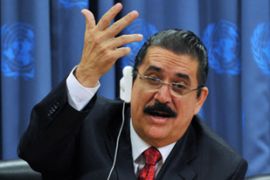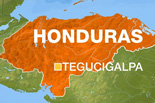Honduran coup leaders tighten grip
Police given expanded powers against opponents of military-backed government.

The Organisation of American States (OAS) had earlier given Honduras a 72-hour deadline to restore Zelaya to the presidency or face expulsion from the 35-nation body.
| In Video |
|
|
“We will wait 72 hours in order to continue with this process [to return to Honduras],” in light of the OAS decision, Zelaya said in Panama City, where he had travelled to attend the inauguration of the new Panamanian president.
“My return to Honduras is scheduled for the weekend,” he said without specifying an exact day. He had said a day earlier that he planned to return to Honduras on Thursday.
Zelaya is set to be accompanied home by Jose Miguel Insulza, the OAS secretary general, the presidents of Argentina and Ecuador, and Miguel d’Escoto Brockmann, the head of the UN General Assembly.
Arrest warning
But Roberto Micheletti, the military-backed interim president, has vowed not to resign, saying that only an armed invasion would restore his ousted predecessor.
 |
| Micheletti, centre, has refused to stand down as interim president [AFP] |
Micheletti has also warned that Zelaya will be arrested should he return, regardless of who is travelling with him.
Insulza said on Wednesday that he had delivered an “ultimatum” to Honduras after an emergency meeting of the OAS.
“If within 72 hours the reinstatement doesn’t happen, the assembly … will meet again to suspend Honduras,” he said, from the OAS headquarters in Washington DC, the US capital.
The OAS condemnation of Honduras followed a resolution by the UN General Assembly calling for the “immediate and unconditional” return of Zelaya to the Honduran presidency.
Deeply polarised
Supporters of Zelaya and the coup leaders have demonstrated in the country’s largest cities since the president was deposed and forced into exile.
Al Jazeera’s Monica Villamizar, reporting from San Pedro Sula, the Honduran commercial capital, said the protests were evidence that the coup had left the country deeply polarised.
“The police said for the moment that they have avoided a full-scale confrontation, but tensions are clearly mounting and anti-riot troops have cordoned off government buildings and shielded supporters of the military-installed government,” she said.
“Zelaya supporters have called for a general strike until he returns. Many said he was a president who was helping the poor.
“But only blocks away, others said Zelaya was a threat to democracy, too easily influenced by left-wing governments like Venezuela and trying to modify the constitution to remain in power.”
‘Drugs link’
| Country facts |
|
|
Micheletti has said that Zelaya was not ousted through a coup but through “a completely legal process as set out in our laws”, calling the move an “act of democracy”.
Zelaya was removed from power as he was about to press ahead with a non-binding referendum on constitutional change on Sunday.
Congress and the courts had declared the move to hold the public vote illegal, accusing Zelaya of trying to change the charter to enable him to run for a second term in office.
Micheletti’s government has also accused Zelaya of involvement in a drugs ring.
“We understand that last Friday a brief of investigation into Zelaya’s alleged links to drugs was sent to the congress for the first time,” Sanchez reported.
“We have been told that there were no previous investigations at congress about drug links to Zelaya. So, some analysts are saying that this investigation is all very suspicious,” she added.
The US has not legally classified the removal of Zelaya as a coup, as this would automatically lead to the suspension of aid to Honduras, an impoverished nation of 7.2 million people.
But the Pentagon on Wednesday suspended all military activities with Tegucigalpa until further notice.


